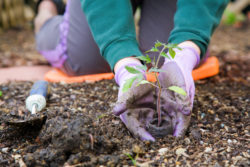Top Class Actions’s website and social media posts use affiliate links. If you make a purchase using such links, we may receive a commission, but it will not result in any additional charges to you. Please review our Affiliate Link Disclosure for more information.

Plaintiff Lee J. filed a lawsuit against Monsanto alleging that using Roundup caused him to develop cancer. He developed a severe skin rash in 2014, two years after he started spraying Roundup as a part of his job as a groundskeeper. The rash later turned into an aggressive form of non-Hodgkin’s lymphoma. His doctors estimate that he has six months to live.
He has filed a lawsuit against Monsanto, aiming to hold the company accountable for not disclosing the alleged glyphosate cancer risk. His complaint joins 2,400 lawsuits filed against Monsanto across the nation. Plaintiffs are seeking settlements that have the potential to amount to billions of dollars, an amount which could cancel out Monsanto’s projected $2.8 billion in Roundup revenue for 2018.
Earlier this month, U.S. District Judge Vince Chhabria of San Francisco started the process of determining whether or not scientific evidence in the trials is using sound methods to reach conclusions and which experts he will approve to call to the stand during the upcoming trials.
Judge Chhabria heard from 10 experts brought forward by attorneys and dubbed the Daubert hearings “Science Week”. Daubert hearings rule out evidence which may be questionable and not suitable for court.
According to a Civil Eats article, “[t]he judge’s role in a Daubert hearing is to find out if any of the evidence shouldn’t be presented to a jury because it lacks validity,” said Dr. Steven N. Goodman, an outside observer who is the Chief of Epidemiology for Health Research and Policy at Stanford School of Medicine. Dr. Goodman has been an instructor in previous judicial education courses on Daubert hearings.
In the Daubert hearings, Monsanto scientists faced off against scientists from the United Nation’s International Agency for Research on Cancer (IARC). The IARC, which is widely acknowledged as the forerunner in cancer research, identified the glyphosate cancer risk in 2015 and labeled the chemical as a probable carcinogen. Monsanto has repeatedly opposed IARC’s ruling and has spent millions of dollars in a campaign to discredit scientists and the IARC, calling the ruling “junk science”.
The two groups of scientists argued back and forth, presenting conflicting data and studies that support each side’s position.
“It’s very hard for a judge to understand in the adversarial context what are legitimate criticisms and what aren’t,” Dr. Goodman told Civil Eats. “And then often what happens is minor or moderate disagreements or uncertainties are blown up or magnified to make the really big distinctions just seem like differing judgments.”
At the end of the hearings, Judge Chhabria shared that he felt confident that there is a glyphosate cancer risk in animals, but the same risk in humans was unclear.
However, the judge noted that it is not his role to decide which side is valid on their opinions on the glyphosate cancer risk. “My role is to decide whether the opinions offered by the plaintiffs’ experts are within the range of reasonableness,” Chhabria said. “And the courts tell us that even a shaky opinion can be admissible because […] that expert will then be subject to cross-examination. And the jury will get to hear all of the evidence, and decide who’s right and who’s wrong.”
If you or a loved one developed cancer after using Roundup as a farm worker or home gardener, you may have a legal claim. Legal migrant farm workers may also seek help. Learn more by filling out the form on this page for a FREE case evaluation.
ATTORNEY ADVERTISING
Top Class Actions is a Proud Member of the American Bar Association
LEGAL INFORMATION IS NOT LEGAL ADVICE
Top Class Actions Legal Statement
©2008 – 2024 Top Class Actions® LLC
Various Trademarks held by their respective owners
This website is not intended for viewing or usage by European Union citizens.
Get Help – It’s Free
Join a Free Roundup Cancer Class Action Lawsuit Investigation
For the most up-to-date information on this case, click here.












